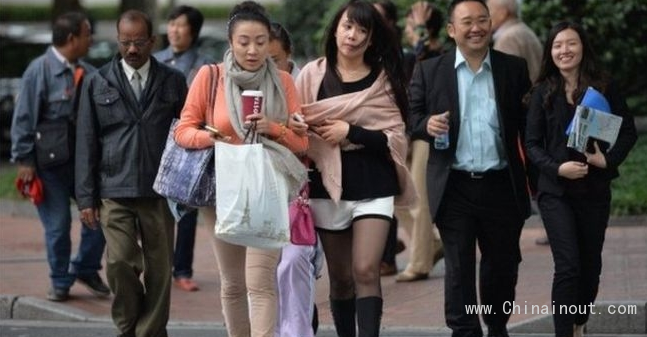可能对中国首季度gdp增速来说,降至7%完全在人们意料之内。毕竟,这个增速本身就是本年度的目标。
可是,让人吃惊的是经济驱动力:消费超过了投资,服务业超过了制造业,同时,国内需求超过了出口。今天的数据加上三月份的数据,还有2014年全年的数据都表明,中国的经济驱动力正在改变。
消费贡献了2014年7.4%经济增速中的3.8%,这已经超过了投资贡献的3.6%。净出口——也就是出口减去进口——贡献为0。
消费对gdp的贡献已经超过了50%,这在2009年只有35%,而市场经济部分消费的贡献则已经从gdp的一半上升到三分之二。
这折射出经济体中服务业的增长,主要为不可交易货物(比如理发)的服务业,已经变得比制造业(包括很多出口货物)更大庞大。
真正的房地产危机
确实,3月份的工业增速为5.6%,创下最慢记录,被零售业(一项消费指标)大幅度超越——零售业的增长超过10%。
这就是中国想要达到的——经济再平衡,从过度依赖出口和投资,到主要依赖它自己的中产阶级消费者与扩张的服务业。
这是他们目标的一部分,他们的目标是,通过提高经济驱动力质量,跨过中等收入陷阱,实现进一步繁荣。
通过消费和服务业驱动增长与欧美发达国家的驱动方式很相似。所以,中国的再平衡标志着,基于工业化的高速增长时代开始终结。
制造业和"追赶效应"让中国在35年内从一个贫穷的国家成为一个中等收入国家。在下一阶段,中国将作为一个中等收入国家继续增长,而增长的速度自然要比初始阶段慢一些。
不准确的统计
毕竟,对新兴市场来说,5%的增速看起来很慢,同时,对发达经济体来说,3%的增速被认为很快。
然而,很多减速会造成危机。对中国来说,很明显的是,房地产和投资可能会过快减速,并造成银行危机。这就是为什么政府会出台措施支撑房地产市场,并降低利率以鼓励借贷。
如果新增就业岗位减少,政府也可能会采取措施提振经济。但是,到目前为止,低速增长并不意味着更少的就业岗位,因为服务型经济是劳动密集型经济,而去年的新增就业岗位达到1300万,已经超过了制定的新增1000万就业的目标。
失业率为5.1%——虽然可能是不准确信息,因为农村就业率很难掌握。
所以,经济再平衡看起来比头版头条的那个《金融危机以来最慢增速》要美好得多。但是,宏观经济学有非常大的不确定性,并不总是可靠的,相反,金融系统中的微观部分才能洞悉天机。
国际货币基金组织昨天下调了中国今年和明年的经济增速至7%。如果增速下滑严重——即使按照计划进行的经济结构调整——也会降低需求,影响偿还贷款的能力。
商业地产开发商都有高杠杆,据报道他们也很难租出自己的写字楼。房价下跌已经席卷了整个国家,贷款已经被放松用以提振需求。
当中国试图做一件其他国家从未做过的事情——让超过10亿的庞大人口同时跨过中等收入陷阱——时,这些问题就毫无疑问的被放大了。
世界上其他所有国家从没有体验过的是:这个世界上第二大经济体正在着手进行一场激动人心的结构转变,转变的过程如此的跌宕起伏。
Probably the least surprising thing about China's GDP growth rate for the first three months of the year is that it slowed to 7%. After all, that's the target for the year.

What's more surprising are the drivers: consumption more than investment, services outpacing manufacturing, and domestic demand rather than exports. Taking today's figures and the data for March together with the full year picture for 2014 shows that China's growth drivers are changing.
Consumption contributed 3.8 percentage points to 2014's 7.4% growth rate, which is more than investment which accounted for 3.6 percentage points. Net exports - so exports minus imports - contributed nothing.
Consumption has risen to account for more than 50% of GDP, which is a sizeable increase from 2009's 35%, and finally places China in the realm of market economies wher consumption is between half to two-thirds of GDP.
It mirrors the rise of the services part of the economy, which includes non-tradeables like haircuts, becoming larger than manufacturing that included many exported goods.
Real estate risk
Indeed, industrial production in March expanded by 5.6%, the slowest on record, which was significantly outpaced by retail sales - a measure of consumption - which grew at over 10%.
This is what China has been trying to achieve - a re-balancing of its economy away from excessive reliance on exports and investment and more on its own middle class consumers and expanding services.
It's part of their aim of overcoming the middle income country trap to become prosperous by improving the quality of the growth drivers in the economy.
Growing more through consumption and services is similar to the growth drivers of developed economies such as the U.S. and Europe. So, China's re-balancing also marks the beginning of the end of a period of rapid growth that is based on industrialisation.
Manufacturing and "catching up" launched China from a poor to a middle income country in the past 35 years. The next stage is growing as a middle income economy, which will naturally be slower than the initial phase.
Statistical uncertainty
After all, 5% growth for an emerging market looks slow while 3% growth for a developed one would be considered fast.
Still, any slowdown poses risks. For China, it is notably in terms of real estate and investment which may be slowing down too quickly and poses a risk for banks. It is why the government has introduced measures to support the housing market and cut interest rates to stimulate lending.
The government is also likely to spend to support the economy if job growth slows. But, so far, a slower growth rate hasn't meant fewer jobs since a services economy is labour-intensive and last year saw 13 million plus jobs created against a 10 million target.
The unemployment rate is 5.1% - though that's likely to be mis-measured since rural area employment isn't well captured.
So, the picture in terms of re-balancing looks better than the headline growth rate of the slowest quarterly growth rate since the global financial crisis. But, the biggest uncertainties lie beyond the macroeconomic statistics, which aren't always reliable, and instead reside in the micro picture for the financial system.Dramatic transformation.
The IMF yesterday downgraded China's growth to below 7% this year and next year. If growth slows down considerably - even if planned as part of the restructuring of the economy - then will lower demand affect the ability to repay loans?
Commercial developers are leveraged and there are reported difficulties in leasing office space. House prices have fallen across the country and requirements have been loosened for mortgages.
These are questions that will undoubtedly be raised as China seeks to do what no other country has done, which is to overcome the middle income trap for a billion-plus population.
What the rest of the world also has never experienced is its second largest economy undertaking such a dramatic structural transformation that is likely to entail volatility.











